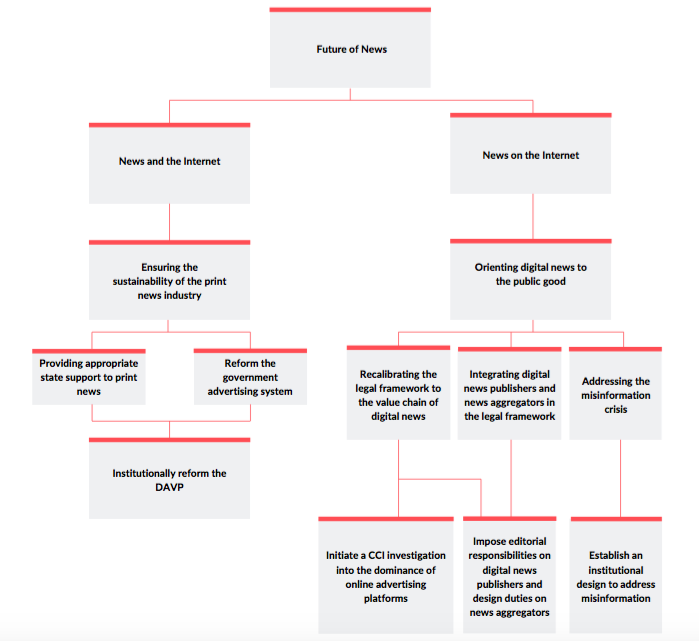Governance
Report on Future of News in India: Vidhi
- 08 Aug 2020
- 3 min read
Why in News
Recently, the Vidhi Centre for Legal Policy (Delhi based independent think-tank) released a report examining the future of news in India.
Key Points
- Findings:
- The worsening economic health of print journalism threatens its ability to credibly inform the public and act as an institutional check upon power.
- The environment of digital news operates in a vacuum of regulation. The emergence of a post-truth paradigm in public communications and the widespread proliferation of misinformation are barriers to realising the benefits of digital news distribution.
- Post-truth includes circumstances in which objective facts are less influential in shaping public opinion than appeals to emotion and personal belief.
- Recommendations: The report has drawn a roadmap of legal reforms to facilitate the transition of high-quality print journalism into the era of digital communications in a manner that benefits the public good.
- Checking the Dominance of Online Advertising Platforms:
- The advertisement-revenue model for digital news may be displaying indications of market failure.
- In an advertising-revenue model, the online companies publish free content that drives hundreds, thousands or millions of visitors to the site on a monthly basis. Advertisers pay the online companies to get in front of these visitors, this helps Businesses generate their revenue from the fees advertisers pay for this access.
- To orient the market for digital news towards the public good, the role and practices of online advertising platforms must be systematically studied by a specialised authority.
- The report has recommended the Competition Commission of India to investigate the dominance of online advertising platforms.
- The advertisement-revenue model for digital news may be displaying indications of market failure.
- Enacting Comprehensive Measures to Address Misinformation:
- It suggests a range of legislative, co-regulatory and voluntary measures which provide an integrated framework to prevent the spread of misinformation and enhance reader literacy. Example:
- Development of industry standards to identify misinformation.
- Use of analytics to identify patterns of misinformation, etc.
- It suggests a range of legislative, co-regulatory and voluntary measures which provide an integrated framework to prevent the spread of misinformation and enhance reader literacy. Example:
- Appropriate Responsibilities on Digital News Entities:
- The report calls to fill the legal vacuum for digital news in a manner which is sensitive to the nuances of online discourse.
- It recommends granting limited powers to the Press Council of India, in conjunction with a voluntary registration procedure and the development of a brief, accessible code of conduct as a mechanism for the imposition of editorial responsibility.
- The role of online platforms in the distribution of news should be addressed through targeted interventions based on the design aspects of such platforms.
- Checking the Dominance of Online Advertising Platforms:







